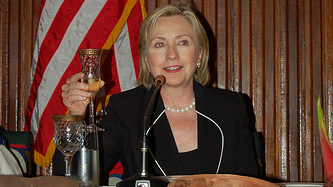The US in Yemen: Valleys of Blind Men

A few weeks ago, I complimented Secretary of State Clinton for what I thought was a particularly good comment that is not heard often enough.
More recently she has been making much less sense on Yemen. In testimony before the Senate Appropriations Committee on March 2 she said: “We know that the Iranians are very much involved in the opposition movements in Yemen.”
Simply put, this is not true.
I’m sure someone in Yemen has told the US that Iran has been sending messages to the Huthis, but A.) the Huthis are not the whole of the protest and B.) even if they were the Huthis are not an Iranian proxy. Evidence this is not.
Sadly, in Yemen, Clinton’s remarks about Iran sound as crazy as Salih’s remarks about a secret room in Tel Aviv controlled by the US sounded to Americans.
The US – through its former diplomats – has made very clear that it has absolutely no idea what happens in Yemen after President Salih leaves. Every study “came up empty.” This is not good.
I have been quite critical of US diplomats and diplomacy in Yemen over the past few years, complaining that the US is sending its least experienced diplomats to a place that demands that the US bring the full power of all its institutional knowledge to bear on the problem. Coupled with this criticism has been my shrill complaint that as the US moves more and more away from managing risk to total risk avoidance it puts the diplomats it does have there (often people on their first posting with no Arabic skills) in an impossible situation. Essentially, asking them to report and help shape policy on a country they have only seen from behind the walls of a fortified embassy or on a harried drive from their fortified compound.
This absent presence does not lend itself well to giving informed reports to policy makers back in Washington. This in turn means that the US is increasingly more dependent on paid informants and on the Yemeni government to provide information. Of course both of these approaches have risks.
For instance, swallowing Yemeni government propaganda whole means that sometimes someone like Secretary of State Clinton says something completely foolish such as, say, that Iran is heavily involved in the protests in Yemen. She didn’t say Iran was directing them, but this is how her statement will be heard in Yemen. Already people in Yemen are wondering why the US is not speaking out about the deaths in Aden and the bombings in Sa’dah as well as the fact that the regime in Sanaa is using thugs to intimidate protesters.
(The reason is that the US and UK and EU haven’t spoken up often enough in the past and now Salih thinks he can continue to attack them with no consequences.)
The only conclusion many in Yemen are coming to is that the US would like President Salih to remain in power because he is “good” on counterterrorism and lets the US bomb AQAP. (Leaving aside the fact that these bombings have only strengthened AQAP – the organization is stronger today – in terms of recruits – than it was when it launched the Christmas Day attack in 2009.)
I am increasingly worried that the US is going down the wrong road in Yemen. It seems to only be asking itself one question: what comes after Salih?
That is an important question, but another one that is important is: what does Yemen look like if Salih stays?
Does anyone in the US actually think he will be able to “govern” in any sense of the word Aden or Sa’dah if he somehow manages to hang onto power. Does the US really want to see Yemen fragment?
Despite the Obama administration’s rhetoric i have yet to see it really concern itself with anything in Yemen besides AQAP. Does the US really think fighting AQAP in Yemen will be easier as parts of the country drift away from the center?
At the moment the US is very concerned with the short-term and preventing another attack on the US homeland – as it should be. But it shouldn’t sacrifice the medium-term of the next two years to a mistaken and short-sighted policy that ensures the survival of the regime.
Just because the US can’t think of alternative in Yemen doesn’t mean that there isn’t one. Of course, there are very real concerns about what comes next in Yemen – this is going to happen at some point, whether Salih leaves now or later. But if he leaves soon, I believe, the US will have a very limited window of opportunity (a matter of months) to positively impact the future of the country.
I dearly hope it has a plan. But the type of thinking and intelligence that led to Clinton saying Iran was heavily involved in the Yemen protests is not good foreshadowing of the months and years to come. (Incidentally, cutting off Title VI money and preventing US academics from going to the country to study does nothing to help the US gain information about a country that it all too often analyzes with guesses and hunches.)




